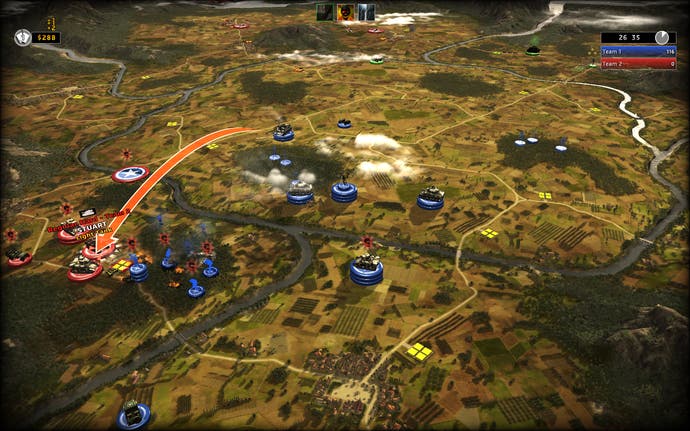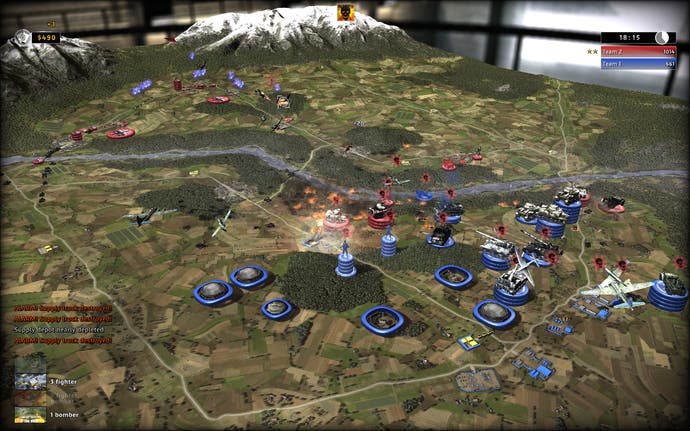R.U.S.E.
Arty essence.
The Reverse Intel ruse is a blast. Build a fat stack of tanks and a couple of infantry units, play the ruse on their sector, and your opponent sees a fat stack of infantry units and a couple of tanks. And the Spy ruse, which uncovers enemy units in a sector, is something you'll use almost constantly.
Mastering the ruses seems a tall order to begin with. There's no real precedent for the system in previous games, and as you may have guessed, there are counter-ruses – such as The Spy – which wipe the veneer of fibs away to reveal the true disposition of troops. Once you're up to speed with how they work and you're dealing them out like some kind of crack-fuelled croupier, you'll wonder just how flat and simplistic the game would seem without them.
And yet, beneath that extra layer of frenetic intelligence management lies a robust RTS. We dealt with the nuances of the console control system in our preview, but it's worth reiterating here that R.U.S.E. packs a startlingly fluid interface (we reviewed the Xbox 360 version of the game). It brings complete freedom of movement and vision and a confidence-inspiring level of battlefield control. It's probably the best physical interface to grace a strategy game, it's completely intuitive, and it's a constant joy to use.

And there are umpteen tiny, thoughtful details that add to the atmosphere. There are times when you'll spend long minutes micro-managing forces at ground level; placing infantry in town-hall squares, setting up air-recon patrols, and jimmying your artillery pieces into just the right position. Zoom the camera right out, and the terrain smoothly scales away to a campaign map, on a table, in a control-room.
Even here, the camera is just free enough to let you have a poke around the environment. Intelligence officers hunch over consoles and jabber into headsets; machinery whirrs, and the beep-de-beep of morse-code machines peppers the air. It's a sudden reality-shift that makes you realise you're actually a General, in a bunker, conducting the war from miles behind the lines. Then the alarm sounds, and it's back in to watch the cannons flash and the soil fly.
There's no shortage of things to do, either. The campaign is of a reasonable length, and it slowly drip-feeds you new ruses and technologies. It's a long and enjoyable way to learn the nuances of the game, and posts you some interesting tactical challenges along the way. We've covered the Operation scenarios already, but it's worth noting that they can be proper tough, and you need to ruse your arse off to beat the AI in these.

As with any RTS, the ultimate challenge lies in skirmish and multiplayer battles, where the pace ramps up insanely. The AI is respectable by anyone's yardstick, but the ultimate challenge is another human brain, and in a sense, a lot of the single-player experiences in R.U.S.E. are really training for the ultimate battleground of player-versus-player. Expect some fierce competition on the leaderboards as players start generating increasingly creative and nasty strategies.
R.U.S.E. offers a pleasing dichotomy: historical wargaming, but with a spanking, modern engine, and a clever new interpretation of intelligence versus counter-intelligence. Granted, it takes some liberties with historical facts and the efficacy of certain weapons, which will doubtless grumble-up the odd purist. The cut-scenes are as rubbery as ageing Edam, and it's just so hard to care about the story that drives the campaign, or the characters that inhabit it; they only really serve to reduce the level of polish somewhat. But none of that is where R.U.S.E.'s appeal lies. It's brave, and manic, and fun to play, and that's everything it needs to be.
R.U.S.E. is released this Friday, 10th September, for PC, Xbox 360 and PS3. We reviewed the Xbox 360 version of the game that we were provided with. When a PS3 version becomes available we'll update this review with our opinion on its Move control scheme and let you know.







